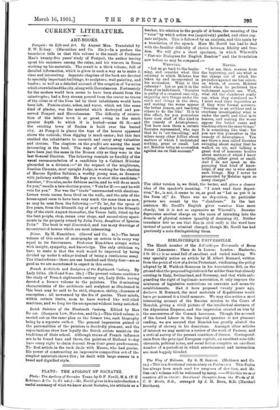PLATO: THE APOLOGY . OF SOCRATES.
Plato: The Apology of Socrates Trans. by D. F Nevill, N.A. (F. E Robinson & Co. is. 6.1. net.) —Mr. Nevill gives in his introduction a useful summary of what we know about Socrates, his attitude as
teacher, his relation to the people of Athens, the meaning of the "voice" by which action was (negatively) guided, and other cog- nate subjects. This is followed by an analysis, and this again by a translation of the speech. Here Mr. Nevin has had to deal with the familiar difficulty of choice between fidelity and free- dom. We will give a short specimen, in which Whewell's "Platonic Dialogues for English Readers" and the translation now before us may be compared :—
WIIEWELL. NEVILL.
"Let us go back to the begin- ning, and consider what this calumny is which Meletus has taken up and incorporated in his accusation. What is this calumny? Let us put it in the form of an indictment. Socrates is guilty of a criminal curiosity, inquiring into things under the earth and things in the skies, and making the worse appear the better reason, and teaching others to do the like.' It is to this effect, for you yourselves have seen stuff of this kind in the comedy of Aristophanes. You have seen there a certain Socrates represented, who says that ho is 'air-travelling,' and utters many other follies about matters of which I understand nothing, great or small. Let not Meletus bring an accusation against me on that account." about matters of which I know nothing, either great or small. And I do not speak as dis- paraging that kind of know- ledge, if any one is wise about such things. May I never be prosecuted by Meletus upon so many charges."
The older version is, we think, the better, and gives a clearer idea of the speaker's meaning. "I must read their deposi- tion," &c., is not, it seems to us, as good as "Let us put it in the form of," &c. There was no deposition, no particular persons are meant by the "slanderers." In the last sentence Mr. Nevill's English gives T001261%11 Meat more closely, but it is not as expressive as Whewell's. Socrates deprecates another charge on the score of intruding into the domain of physical science (possibly of despising it). Neither translator lets us see that Slim (a civil suit) is the word here instead of .ypaoi (a criminal charge), though Mr. Nevin has had previously a note distinguishing them.
"Let me, then, resume from the beginning, and see what is the charge out of which the prejudice against me has arisen. on which, of course, Meletus relied when he preferred this indictment against me. Well, what did the slanderers really say, when they slandered me P I must read their deposition as if they were formal accusers. Socrates is an evildoer and is overbusy investigating what is under the earth and what is in heaven, and making the worse appear the better cause and teaching others the same things.' It is something like that : for you saw this yourselves in the comedy of Arietophanes. You saw there a man called Socrates swinging about saying that he walked on air, and talking a great deal of nonsense besides






































 Previous page
Previous page